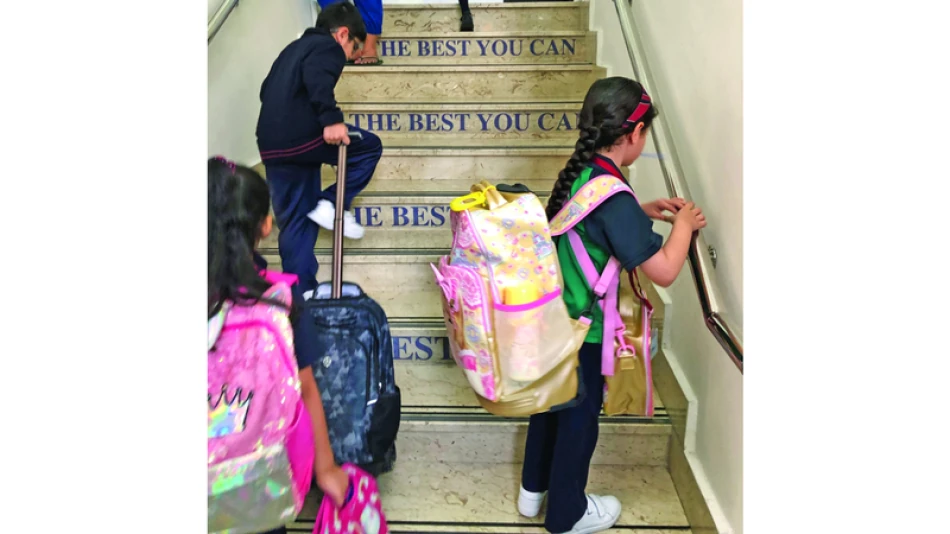
Lighten Your Load: Practical Steps to Reduce Backpack Weight by 50% and Protect Spinal Health
UAE Schools Launch Aggressive Campaign to Cut Student Backpack Weight by Half
Schools across the UAE are implementing sweeping reforms to address the chronic problem of overweight school bags, mandating weight reductions of up to 50% and introducing strict regulatory oversight. The Abu Dhabi Department of Education and Knowledge has set legally binding limits requiring backpacks not exceed 10% of a student's body weight, with schools facing legal penalties for non-compliance by February 2026.
Regulatory Crackdown Signals Serious Health Concerns
The new policy represents a significant shift from voluntary guidelines to mandatory enforcement. Schools must now employ dedicated health and safety officers working full-time on campus, indicating authorities view this as a critical public health issue rather than a minor inconvenience.
The weight limits are surprisingly specific and restrictive: kindergarten through second grade bags cannot exceed 2 kilograms, while high school students face a maximum of 10 kilograms. For context, a typical high schooler weighing 50 kilograms would be limited to a backpack representing just 20% of their body weight.
Digital Transformation as Solution
Schools are pivoting toward technological solutions that mirror global education trends. The transition to electronic homework systems, digital textbooks, and weekly worksheet packets instead of heavy textbooks suggests the UAE is using this health initiative to accelerate educational digitization.
This approach aligns with similar reforms in Singapore and parts of the United States, where districts have embraced tablet-based learning partly to address ergonomic concerns. However, the UAE's regulatory approach is more aggressive than most international counterparts.
Medical Evidence Drives Policy Change
Orthopedic specialists are reporting alarming rates of spinal injuries among students. Dr. Ahmed Bahaa Moussa, an orthopedic surgery consultant, warns that heavy backpacks are causing chronic muscle fatigue, reduced physical activity, and concentration difficulties that directly impact academic performance.
Pediatric specialist Dr. Aya Abdelnasser notes even more severe consequences: walking disorders, increased fall risk, and potential spinal curvature that could cause permanent postural deformation. The medical consensus suggests this isn't merely about temporary discomfort but long-term developmental damage.
Parents Bear Responsibility
Teachers are pointing to parental behavior as a contributing factor, citing families who prioritize fashionable designer bags over ergonomic specifications, and fail to monitor daily bag contents. Many parents reportedly send children with entire sets of textbooks rather than checking daily schedules.
Market Implications and Implementation Challenges
The new regulations will likely disrupt the school supply market, potentially benefiting manufacturers of lightweight, ergonomically-designed bags while pressuring traditional textbook publishers to accelerate digital offerings.
Schools face significant infrastructure investments: installing classroom lockers, purchasing weighing scales for every classroom, and hiring additional staff. The mandate for dedicated health and safety officers suggests substantial ongoing operational costs.
Enforcement Timeline Creates Pressure
The February 2026 compliance deadline gives schools approximately one academic year to implement comprehensive changes. This tight timeline suggests authorities expect resistance and are using legal consequences to ensure adoption.
The policy's success will likely depend on sustained parental cooperation and schools' ability to maintain digital infrastructure. If effective, the UAE could become a model for other nations grappling with similar student health concerns, particularly in education systems emphasizing heavy textbook loads.
Broader Educational Philosophy Shift
Beyond immediate health benefits, this initiative reflects a fundamental reconsideration of how education should be delivered. By forcing schools to prioritize student physical wellbeing over traditional teaching methods, the UAE is signaling that educational effectiveness includes student health outcomes.
The integration of weighing scales in classrooms and mandatory bag inspections suggests a data-driven approach to monitoring compliance, potentially creating valuable research opportunities on the relationship between physical comfort and learning outcomes.
Most Viewed News

 Sara Khaled
Sara Khaled






